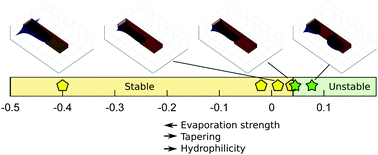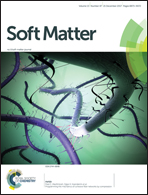Using evaporation to control capillary instabilities in micro-systems†
Abstract
The instabilities of fluid interfaces represent both a limitation and an opportunity for the fabrication of small-scale devices. Just as non-uniform capillary pressures can destroy micro-electrical mechanical systems (MEMS), so they can guide the assembly of novel solid and fluid structures. In many such applications the interface appears during an evaporation process and is therefore only present temporarily. It is commonly assumed that this evaporation simply guides the interface through a sequence of equilibrium configurations, and that the rate of evaporation only sets the timescale of this sequence. Here, we use Lattice-Boltzmann simulations and a theoretical analysis to show that, in fact, the rate of evaporation can be a factor in determining the onset and form of dynamical capillary instabilities. Our results shed light on the role of evaporation in previous experiments, and open the possibility of exploiting diffusive mass transfer to directly control capillary flows in MEMS applications.



 Please wait while we load your content...
Please wait while we load your content...